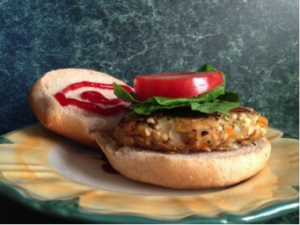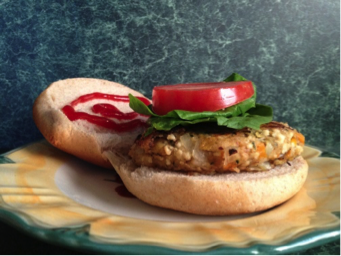Fall for Vegetarian Options
 Many people have decided to forgo meat and live a vegetarian lifestyle. The reasons people choose to make this change vary from person to person but there are plenty of plant-based food options available for anyone considering vegetarianism.
Many people have decided to forgo meat and live a vegetarian lifestyle. The reasons people choose to make this change vary from person to person but there are plenty of plant-based food options available for anyone considering vegetarianism.
October is National Vegetarian Awareness Month and the fall is the perfect time to try out some meals without meat.
Types of Vegetarianism
Being vegetarian doesn’t simply mean not eating meat or animal products. There are other types of vegetarian meal planning options that may suit you better and, most importantly, make your body happier!
- Pescetarians only eat fish and seafood (semi-vegetarian).
- Pollotarians only eat poultry – no meat (semi-vegetarian).
- Lacto-ovo-vegetarians are the most common type of vegetarians. They do not eat any meat, poultry, or fish but do consume dairy (lacto) and eggs (ovo).
- Ovo-vegetarians do not eat meat, poultry, fish or dairy. They do eat eggs.
- Vegans do not eat any form of meat or any animal by-products, including honey, beeswax, or gelatin. They also don’t purchase or support products such as silk, leather or wool.
Nutrient Balance
Are you worried you may not get adequate nutrition if you eliminate animal products? You’re not alone. Many people feel like they’ll be lacking in protein and other important nutrients if they choose to not eat animal products. This is not the case. Millions of people live very healthy lives without animal products. Vegetarian diets actually provide a great amount of protein if you eat the right foods. Foods like beans, nuts, peas, and soy products (and egg and dairy products for lacto-ovo vegetarians) are excellent sources of plant-based proteins.
Here are 4 important vitamins and minerals to keep in mind when switching to a vegetarian-based lifestyle.
- Iron – Iron is important in transporting oxygen in your bloodstream. Since iron is found primarily in meat, it is important for vegetarians to choose iron-fortified cereals, spinach, kidney beans, lentils, turnips, whole wheat breads and peas.
- Calcium – Calcium is critical for healthy bones and teeth. Vegans and vegetarians that do not consume dairy can find calcium in calcium-fortified soymilk, cereals and orange juice, collard greens, bok choy, turnip greens and mustard greens.
- Zinc – Another mineral that vegetarians can easily miss out on is zinc. Zinc is used by your body to promote immune response and also acts as an antioxidant. Zinc is found in many varieties of beans, wheat germ and pumpkin seeds.
- Vitamin B12 – This essential vitamin is found only in animal products and some fortified foods. Vitamin B12 pays a key role in the functioning of the brain and nervous systems so it’s critical for vegetarians and especially vegans to get adequate B12 intake, which may include supplements. Foods that contain B12 are soymilk, some breakfast cereals, veggie burgers, and nutritional yeast.
Nutrient balance is especially important for pregnant and lactating women so it’s best to speak with your physician if you’re pregnant or plan on becoming pregnant to ensure you’re meeting the nutritional needs for yourself and your infant.
3 Vegetarian Meals to Try Today
- Cook up vegetarian chili with a variety of beans such as kidney beans, black beans, and pinto beans. Pair it with brown rice for a complete protein.
- Make your own lentil soup – use lentils as the protein base and add tomatoes, carrots, onions and simmer in vegetable broth.
- Add chickpeas to your salad for a delicious twist to your traditional salad.
Even if you don’t have plans to become a vegetarian, replacing one or two animal protein meals a week can be helpful to both your health and your wallet. Beans and legumes, such as lentils, are less expensive per pound than meats and offer lots of fiber, vitamins, and minerals. You may find you don’t miss the meat!
Your turn to take action: What are some of your favorite plant-based foods? Let me know in the comments below!


Leave a Reply
Want to join the discussion?Feel free to contribute!